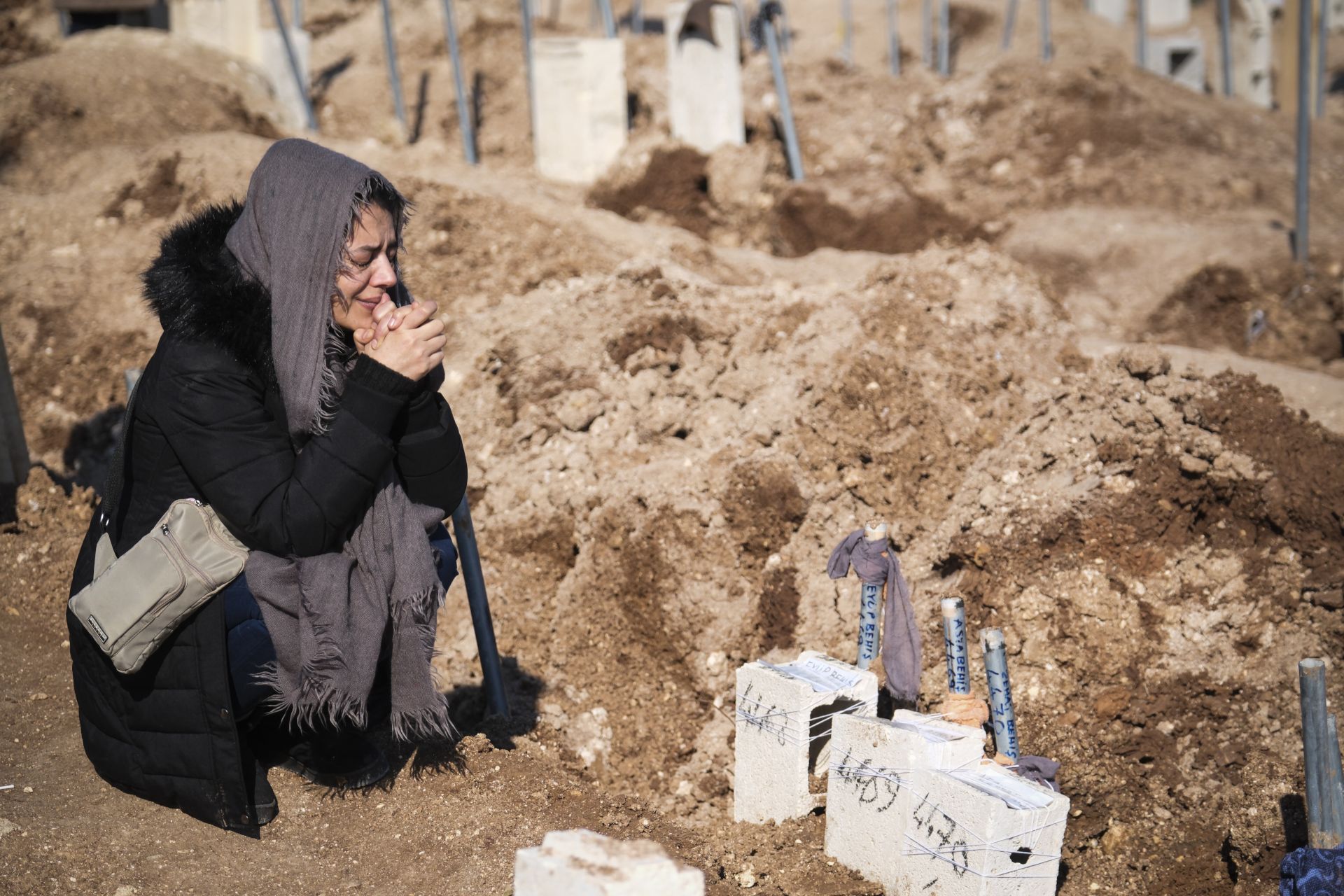“Spotlight” is a newsletter about underreported cultural trends and news from around the world, emailed to subscribers every Monday, Wednesday and Friday. Sign up here.
The series of consecutive earthquakes that struck southeastern Turkey and neighboring parts of Syria in the early hours of Feb. 6 has resulted in one of the worst natural disasters anywhere in the world this century. One week on, as of the morning of Monday, Feb. 13, the combined death toll for both countries had surpassed 36,000. The immense scale of destruction, staggering loss of life and profound logistical challenges have made even dignified funerals for loved ones almost impossible for thousands of grieving families.
So dire is the situation that hospitals have transformed into morgues. The number of bodies is so vast that most facilities reportedly lack sufficient quantities of burial shrouds, which are religious requirements for Muslims according to specific Islamic funeral rituals. One grim video circulated from the social media account of a state hospital in Turkey’s Osmaniye, in one of the affected provinces, showing dozens of unidentified deceased people, wrapped in blankets, scattered on the ground. “We cannot find enough shrouds to put people in, and we wrap them in bags and blankets and bury them,” the individual who shot the video told New Lines.
It was one of many videos showing similar scenes of hospitals turned into morgues, as in the city of Adiyaman, or in Gaziantep, where victims were laid in schools before burial. A cemetery in Iskenderun was expanded to accommodate the constant influx of newly delivered bodies.
Illustrating the scale of the burial problem, the families of victims pleaded for religious edicts (fatwas) to clarify whether duvet covers, body bags or just the clothes of the deceased would be deemed acceptable for burial in such extraordinary circumstances.
On its official website, Turkey’s Diyanet, or Directorate of Religious Affairs, included such fatwas in a section devoted to “frequently asked questions from the earthquake zone.” It stated that it was a religious obligation to shroud the corpse as much as possible during burial, but it was also permissible to deem a body bag as a shroud. It added that washing the body with water before burial was necessary, but that a dry wash (known as tayammum) was permissible in the circumstances. If a dry wash was not possible, funeral prayers were to be performed and the body buried in its current state.
A respectful preservation of bodies has been almost impossible in the earthquake’s aftermath, so the agency tasked with disaster relief and management, known as AFAD, published a statement about burial procedures on Feb. 8. After a waiting period of 24 hours, the DNA, fingerprints and photographs of unidentified bodies would be taken, followed by their immediate burial.
“AFAD’s decision to bury the bodies in a short time should be seen through two perspectives; that of a huge disaster and colossal death toll,” wrote Ahmet Hilal, Chair of the Association of Forensic Medicine Specialists, on Feb. 10, in an email exchange with New Lines.
“The burial of the victims without proper identification can affect the relatives,” wrote Hilal, “as they won’t be able to find loved ones, and that will increase their suffering. For this reason, unidentified bodies must be accurately photographed, fingerprinted, medically identified, and samples taken for DNA analysis before burial.”
Hilal spoke about reports of mass funerals taking place from Adiyaman to Hatay provinces, with construction equipment used to bury groups of corpses lined up side by side in a pit, instead of in individual graves. “I hope the photos from the tweet are not true. Such burial is not correct. People need to be buried according to the specific numbers given in their individual records. These images hurt the conscience of the society.”
There is also a growing health risk, due to unburied bodies in the streets, which have locals reporting odors in quake-stricken areas. Hilal noted that delaying the funerals of unattended victims threatens public health, as bodies start decomposing, which can lead to infectious diseases.
Turkey has seen disastrous earthquakes in the past. Hilal speaks from direct experience about the repercussions of improper forensic examination and the lack of data collection for the identification of deceased victims prior to their burial. “Like we saw after the Golcuk earthquake in 1999, family members will seek their relatives for years, through courts, and will demand opening the graves and DNA examination.”
Hilal works in Adana, one of the 10 provinces affected by the earthquake, albeit less so than others hit worst by destruction and loss of life, like Kahramanmaras, Hatay and Adiyaman. Three days after the earthquake, he went to hospitals in Osmaniye and Hatay (which includes the cities of Iskenderun and Antakya) and saw numerous volunteers and doctors in residence on site. Yet he pointed in his email to organizational problems that he noticed due to the sheer scale of the destruction.
“It is not that volunteer forensic medicine experts are not given permissions to work, but it is difficult to overcome bureaucratic obstacles,” he said, referring to allegations that the Ministry of Health prevented volunteer experts from working in the earthquake-stricken areas. Volunteers have been trapped in a limbo, where their universities need to ask for permission from the official Forensic Medicine Institution, while the same body asked for pleas from the same universities, Hilal added.
He also observed some progress made on Friday. Many colleagues were able to start participating as volunteers by obtaining necessary permissions from the universities. It might now be too late to save lives, but they still may at least be able to help provide a dignified burial for the hundreds of victims who still await it.
Sign up to our mailing list to receive our stories in your inbox.



